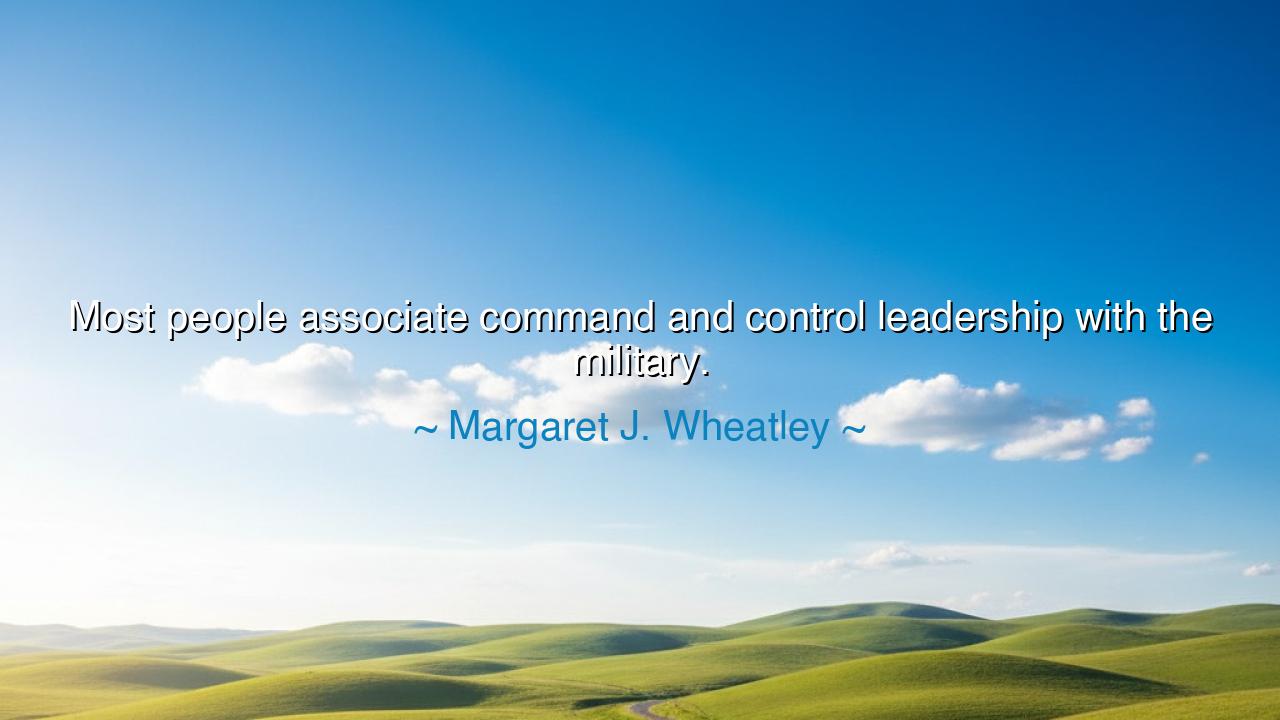
Most people associate command and control leadership with the






The words of Margaret J. Wheatley — “Most people associate command and control leadership with the military” — are not simply an observation, but a challenge to awaken the mind to a deeper understanding of what true leadership means. For ages, the idea of command and control has been bound to the image of soldiers, orders, and obedience — a structure of authority that demands discipline and precision. Yet Wheatley, a thinker of systems and human behavior, speaks to the illusion behind this association. She invites us to see that real leadership, even in the military, is not sustained by domination, but by trust, coordination, and shared purpose.
In the ancient style, we might say: leadership born only of command is like a river forced into a narrow channel — it flows fast but shallow, eroding the banks that hold it. True power, however, is not control but harmony. It is the ability to inspire order through meaning, not fear. Wheatley’s insight reminds us that the essence of leadership is not in giving orders, but in awakening alignment — in guiding others so that their wills converge freely toward a shared goal. The misconception that the military is only about control blinds us to the profound cooperation, discipline, and mutual respect that underlie its strength.
Indeed, the great generals of history have understood this truth. Consider Alexander the Great, whose armies followed him not because they were forced, but because they believed. His soldiers crossed deserts and mountains with him, driven by loyalty born from admiration. Alexander led from the front; he shared their hunger and wounds, showing that the bond between leader and follower is not mechanical, but spiritual. This is not command and control, but command and trust — the art of leading hearts, not merely bodies.
Even within the modern military, the evolution of leadership reflects Wheatley’s vision. Commanders today are taught not only tactics, but empathy — the power to listen, to adapt, to understand the complexity of human motivation. The soldier who follows blindly may obey orders, but the one who understands why he fights will give his all. The power of purpose transforms control into collaboration. Thus, the true strength of any army — or organization — lies not in obedience alone, but in shared conviction.
Wheatley’s wisdom also reaches beyond the battlefield. In the world of business, politics, and society, too many still lead by command — giving orders, enforcing hierarchy, silencing creativity. They mistake authority for leadership and compliance for loyalty. But in an age of complexity, where systems shift like sand, no one mind can control all outcomes. The ancient leaders who built empires would tell us this: the wise ruler governs not by constraint, but by influence and understanding.
The origin of this quote lies in Wheatley’s lifelong study of organizations and human systems. She saw how businesses and governments mirrored the old structures of command, assuming control was the only way to manage people. Yet, drawing from both modern science and ancient philosophy, she revealed that life itself — from ecosystems to communities — thrives through self-organization, not domination. Her work teaches that leadership must evolve from control to connection, from hierarchy to harmony.
Let us then learn from her words. Whether we lead a nation, a company, or a family, we must remember that true leadership is service, not control. To command without understanding is to build walls; to lead with wisdom is to build bridges. Inspire rather than intimidate. Listen rather than dictate. Guide rather than grasp. For when the leader trusts his people and his people trust the leader, they become like the fingers of one hand — strong, united, and capable of great works.
And so, let the final lesson be this: authority is given by position, but leadership is earned by trust. Do not confuse control with command, nor obedience with respect. Seek to lead as the ancients did — by embodying the values you wish to awaken in others. For in every age and every field, the greatest leaders are not those who rule by fear, but those who move the hearts of men with courage, wisdom, and faith.






AAdministratorAdministrator
Welcome, honored guests. Please leave a comment, we will respond soon